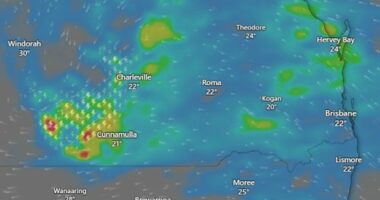Share this @internewscast.com
ANALYSIS: The internet is evil, dangerous, seductive and manipulative.
It can also be entertaining, informative, and positive.
The formidable challenge we face today is determining the difference and regaining control over the internet to tackle the negative forces before they further encourage terrorism, child exploitation, and fraud against unsuspecting victims.
One expert has a solution which would require anybody logging on to provide facial recognition and a fingerprint before they were allowed access. Â
More of that ahead, but is it possible? Probably not.
Regardless, Australia must lead the way on this because the crooks say we are too nice, the easiest of targets, world leading suckers being scammed.
Let’s face it. The net is not going away.
It is so deeply embedded in life it can’t be turned off even if we wanted to do that.
It is like the cute lion club abandoned by its mother and raised by humans.
One day, the cub is a fully grown animal that suddenly turns on its much-loved foster parent and snaps their neck.
The internet is possibly that dangerous.
But unlike the lion that cuddles a human moments before killing them, the world has been given some warning of what may come.
So what do we do? It’s a huge problem. Think about these figures. This is one large lion.Â
It’s estimated 4.5 billion people have access to the net.
Despite early work it really started to emerge only in the mid-1980s.
The first browser, Mosaic, is around 30 years old. The beast is young.
Although it’s impossible to fact-check nerds, the estimate is that by this year there will be 463 exabytes of data created daily on the net.
One nerd says, for context, every word spoken by every human would be 5 exabytes.Â
More context. An exabyte is one quintillion bytes, which is a one with 18 zeros after it.
Even Victoria’s state debt doesn’t have figures like that.Â
All this I know from several sources on the net. You get the point.

What’s available is beyond comprehension. So how much of it is hurting mankind?
There are scams, lies, and dangerous pornography.
The dark web, which is really quite accessible, provides a gathering place for paedophiles, drug dealers and bomb makers.
It allows organised crime and terrorists to thrive.
The scams help fund terrorism, the dark web helps them organise their bloody work with the money raised.
Answers? Ken Gamble is a private detective, arguably Australia’s leading scam buster.
He is chair of IFW Global and has helped bust scams around the world.
He’s been ringing alarm bells for more than a decade with appearances before parliamentary inquiries.
He says governments and police are not doing enough.
Few have listened, which he says makes Australians an even bigger target.
During the podcast Neil Mitchell Asks Why?, it was mentioned that organized crime networks, primarily operated by Israeli, Chinese, and British groups, are highly advanced and efficiently structured.
They use the telephone and the web, with scam centres staffed by hundreds of people tracking down vulnerable victims.
“Australia is the number one target in the world. We have been for a number of years,” Gamble said.
“I’ve spoken with numerous criminals from different nations whom we’ve apprehended in our operations, and they all express the same sentiment: Australians are the easiest targets for deception.”
In a way, it’s a compliment.
Most Australians are hard-working, honest people who do not expect to see a crook behind every tree willing to promise the world and steal everything.
He says although organised crime is behind the more sophisticated scams, local criminals are not missing out:
“Increasingly, we are seeing scams perpetrated in Australia by other Australians,” Gamble said.
“We are seeing a lot of scams come out of the Gold Coast, for example.
“The police response is so slow they can run their scam for three months, shut it down, pocket a million dollars or more and and get on with the next one.
“By the time law enforcement comes along, they’re long gone.”
Gamble also warns scammers are extremely dangerous, and his own life has been threatened.
He says the risk is not only to gullible or greedy people and their bank accounts, but to human life and world peace.
“We’ve traced some of these scams to members of terrorist organisations,” he said.
“We’ve traced it to people in Israel, Egypt, Lebanon.
“We’ve got a number of cases where we have hard evidence that these dollars have gone into the hands of Hezbollah.”
He said apart from organised crime motorcycle gangs and traditional mafia, were now involved in scamming because it provides high profit for low risk.
And it is getting worse. Scams are becoming more sophisticated.
Artificial intelligence is the future.
There have already been excellent AI fakes of the prime minister supposedly supporting an investment plan, and of celebrities endorsing things the actual celebrities have never heard about.Â
AI scams and political tricks will be harder to pick and they are effectively uncontrollable.Â
Imagine an Australian election campaign where Anthony Albanese is seen on video promising a new tax on everybody earning more than $50,000.
Or a video of Sussan Ley saying, if elected, she will make Scott Morrison governor-general.
Gamble has seen himself in deep fake, with an American accent, saying things designed to discredit him.Â
He has also seen several fake websites established in the name of his company, again aimed to discredit because he was becoming too good at catching the bad guys.
Obviously, we would all benefit from stronger lessons in scepticism and online caution.
How do you know a website is genuine? How do you know that message is real?
An example: I received an email with a Tax Office logo which began with a warning to watch out for Tax Office scams.
The scammer was warning about scammers to try to build their credibility.
Scepticism is essential, even in a trusting country.
Gamble, who has seen the beast at its worst, has a radical plan.
“Nobody is policing the internet as a whole. Nobody. No national or international global enforcement agency.
“We live in a society where people enjoy their freedoms.
“They do not want to have to put their fingerprint in to access the net.
“But I would love to see when you log in to the net you are identified by your face and your fingerprint.
“Of course, it can be exploited but it would be a good start.
“It will probably never happen but that’s one way of enforcing the law and actually regulating the use of the internet.”
Would the average person accept such a restriction? Would the crooks take more than five minutes to find a way around it?
Sadly, the message behind use of the internet, the World Wide Web, and text messages, is: be sceptical, be careful, if it looks too good to be true, it isn’t.Â
And a footnote from history: in the mid-1950s when television was introduced, critics warned it would harm the world through declining intellectual and social skills, and become a new tool for propaganda and manipulation.
Those critics had a point but the world adapted and survived.
The net does all those things too, but the difference is TV doesn’t empty your bank account and use the money to blow up a bus.
Take care. Being trusting is no longer endearing. It’s dangerous.Â
Neil Mitchell is a Nine news analyst.
His podcasts, both interviews and analysis, appear each Tuesday and Thursday as Neil Mitchell asks why?












